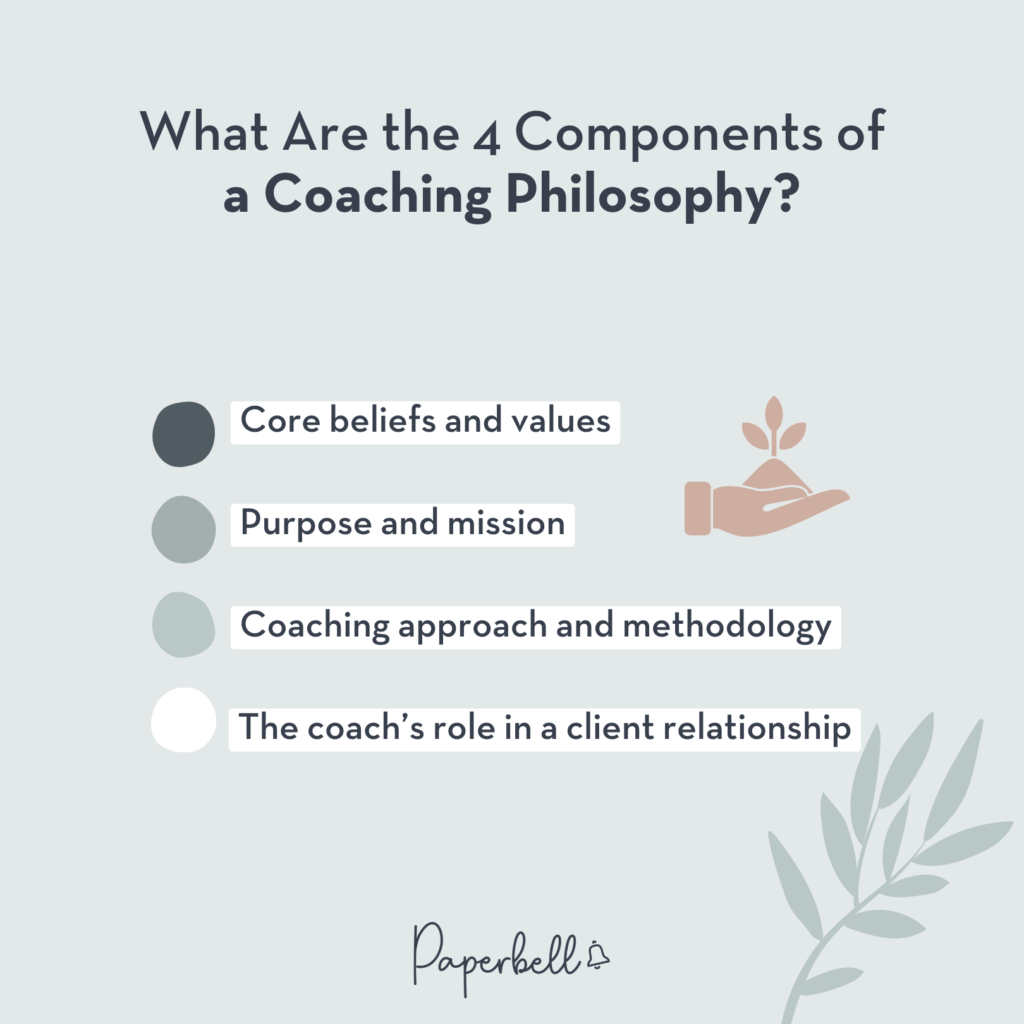If you’re a coach, that means you have a philosophy—whether you’re aware of it or not. It drives all your decisions, from structuring your sessions to choosing certifications.
It allows you to maintain your integrity and express your values. It will also serve as a compass to choose who to work with, which media outlets to represent, and which events to speak at.
In this article, we’ll break down what a coaching philosophy is (and isn’t) and how you can develop your own.
What is a Core Coaching Philosophy?
Your coaching philosophy is your underlying belief system about your vocation. Coaching might mean different things to different people, so you must define it yourself.
Naturally, settling on a coaching philosophy will determine the clientele you’ll be working with and your relationship with them. It will also influence your coaching methodology and the practices you want to avoid.
You don’t necessarily have to develop your coaching philosophy from scratch; you can look at the principles your role models act by and make them your own. If you’re taking a certification program, it might influence how you think about coaching, too.
What matters is that the philosophy of coaching you stand for is authentic to you. It’s not about debating how others should do coaching but about committing to your own principles, values, and ideals that make up who you are as a professional. It’s about doing things in a way that feels right to you.
What Are the 4 Components of a Coaching Philosophy?
Here’s a way to break down a coaching philosophy into four components:
- Core beliefs and values: These are the foundational principles guiding a coach’s approach, including beliefs about human potential and the importance of concepts like empathy, honesty, and integrity.
- Purpose and mission: This defines the overarching goals of the coach’s work (i.e., why they coach and what outcomes they aim to achieve with their clients).
- Coaching approach and methodology: The techniques, strategies, and frameworks a coach uses during sessions.
- The coach’s role in a client relationship: This focuses on the dynamics of the coach-client interaction.

The Difference Between a Coaching Philosophy and a Coaching Style
It’s easy to confuse your coaching philosophy with the coaching styles you use in your sessions. The main difference is that your coaching philosophy remains the same throughout your entire career. These are the core values and principles you stand by, so they’re unlikely to change over time—unless you change with them.
On the other hand, your coaching style could change with every client or even within the same coaching conversation. It adapts to who you’re working with, their goals, and what fits the situation.
Think of it as values versus communication—your core values as a person stay mostly the same throughout your life, but your communication style adapts to the people you interact with throughout the day.
[ Read: Are You Using All 5 Of These Coaching Styles In Your Practice? ]
Your coaching philosophy is also irrelevant to the type of coaching you do. You can apply the same philosophy whether you’re a business coach, health coach, life coach, or relationship coach.
Coaching Philosophy Examples
There are no set coaching philosophies, just like there’s no official “rulebook” to doing coaching right. That’s what gives you the freedom to develop your own playbook!
But you might find that some principles overlap in the philosophies most coaches advocate for. For example, many professionals and organizations follow the International Coaching Federation (ICF) code of ethics, even if they’re not associated with it.
The following examples are the three most common coaching philosophies you can draw from in your own work.
Winner’s Mindset Coaching
This coaching philosophy is largely inspired by sports coaches who drive their teams to success. Just like on the sports field, they believe that there’s a clear and definitive goal to strive for with every client, regardless of the area of life or business they’re focusing on.
Their only agenda is to make their clients win at all costs. They do this by “keeping their eyes on the prize,” reminding them of the main goal they’re working toward in every coaching session.
Every other objective becomes a subset of the main goal that they’ve set at the very beginning of the coaching relationship. They choose the most effective strategies to help their clients reach their ultimate goals and motivate them to keep up their momentum.
Autonomous Coaching
This philosophy of coaching respects the client’s personal freedom and autonomy above everything else. Coaches who adopt this principle ensure they don’t advise or influence their coachee with their own agenda. Even if they share their personal experience, they do it in a way that says, “This might or might not resonate with you, but this is what happened to me as an example.”
Following the principles of autonomous coaching empowers your clients to discover their own answers to their most burning questions in life. It leaves room for a change of mind and creates a safe space for your coachee to find their truth, independent from outside influences.
The autonomous coaching philosophy believes that the goal is personal growth, and our life goals are only a subset of that objective. Thus, if the client’s objectives keep changing but they’re still growing and evolving, the coaching process is deemed successful.
Methodist Coaching
Coaches who follow this principle say there’s a definitive plan or solution for every client that best suits them. However, this plan will differ from every other client’s plan based on who they are and their challenges.
Their primary approach to coaching is developing a customized plan for the coachee with the tools and coaching models that work for them specifically. They craft a tailor-made recipe from their broad coaching methodology and give their clients plenty of exercises and homework to move closer to their main objective.
Strength-Based Coaching
This coaching philosophy focuses on identifying and leveraging a client’s talents and abilities. Inspired by positive psychology, strengths-based coaches aim to uncover and amplify these strengths to drive clients toward their goals.
By consistently highlighting and capitalizing on the client’s natural abilities, coaches can instill motivation and confidence in them. Every strategy and goal is framed around these strengths, creating a positive momentum that leads to continuous improvement.
3 Inspiring Coaching Philosophy Examples
Coaching philosophies aren’t always spelled out; they’re more likely to be blended into how coaches talk about their business. Here are some examples to illustrate this.
Rich Litvin: Tiny Shifts for Big Changes
Rich believes that high achievers have the exact same challenges as the rest of us. They do things that few people can do, yet, whatever is coming next still feels like a giant leap to them.
On his website, he explains how there’s only a 0.1% difference between the genetic make-up of all humans. This means that at the level of high performance, the tiniest shifts in perspective let high-achievers win.
As a “lifelong student of human behavior,” he has done extensive research on how these tiny changes can create radical differences and help take those leaps in achievement.
As he says, “Coaching is powerful and impactful. And I help my clients make these tiny shifts that change everything.”
He also shares why he’s the perfect person for the job. He lived most of his life feeling powerless. No matter how much he achieved, he envied those who seemed to create more.
Ultimately, it became his gift: Seeing where other people are powerful—even when they can’t see it themselves.
Christine Hassler: Lived Transformation
Christine defines her approach to coaching as “identifying what’s holding someone back and compassionately guiding them to clarity.”
On her About page, you can read her story about how coaching let her get off antidepressants and other medications after being on them for 20 years. Her own transformation became the root of her belief in the power of coaching and her philosophy.
Her extensive list of certifications and educational background shows she’s a lifelong learner, too. A unique element of her coaching methodology is the term “expectation hangovers,” a phenomenon she identified and trademarked.
Jason Goldberg: The Jimmy Fallon of Personal Growth
Jason Goldberg is a living testament to the fact that coaching doesn’t need to be serious. In fact, he defines himself as the Jimmy Fallon of personal growth.
Besides being an award-winning entrepreneur and TEDx Speaker, he also introduces himself on his website as a “bacon-atarian,” a funky sock lover, a former rapper, and a previously 332lb man.
His signature coaching style blends simple and transformational wisdom, captivating storytelling, practical business mentorship, and belly-busting humor. He intends to make personal growth less “personal growth-y” and to leave everyone he meets with at least 5% more joy than when he found them.
How to Create Your Own Coaching Philosophy
Crafting your own coaching philosophy is similar to defining your core values and beliefs, which you’re probably familiar with as a coach. These beliefs form the innermost part of your identity as a professional. They are so natural to you that they can easily become your blind spot.
Here’s how you can uncover them and create your own definition of coaching.
First, Do Your Research
Look at the examples above and other coaching philosophies from professionals you want to emulate. Use them as reference points, and see what you agree or disagree with to understand your own values about coaching.
If you plan to get certified by a coaching institution or buy a coaching franchise, this can guide you in choosing the right opportunity. It will also serve as a compass when you select your coaching mentor, someone who will potentially greatly influence your career.
Next, Coach Yourself
It’s time to be your own coach and get a deeper understanding of your beliefs in the context of your vocation! Answering these coaching questions will shed some light on what you stand for in this field:
- What’s your own definition of coaching?
- Why is coaching important?
- What got you into this field in the first place?
- What kind of (coaching) support do you wish you had when you were going through a crisis in the past?
- What do you think should happen in a coaching conversation?
- What doesn’t have a place in a coaching conversation?
- What do you think is the most effective approach to coaching to create the results your clients need?
- How would you describe a coaching relationship?
Finally, Distill the Essence of It
Now that you have clarity on your yeses and nos, you can write out your coaching philosophy in a more articulated form. You can make it a part of your mission statement, turn it into a code of conduct, or write a whole one-pager about your philosophy.
[ Read: The 6 Steps I Use to Come Up with Captivating Life-Coaching Mission Statements ]
5 Coaching Philosophy Templates
Here are a few templates to brainstorm your philosophy as a coach. Make sure you don’t just copy and paste them; revise them and make them your own.
- Empowered action: I help clients turn their fears into fuel for growth. I believe that true transformation happens when we take bold, consistent action aligned with our deepest values.
- Mindful Mastery: I help clients cultivate awareness and intentionality in every aspect of their lives. I believe that lasting change begins with a deep understanding of oneself and the power of presence.
- Resilient Leadership: I help individuals navigate life’s challenges with strength and grace. I believe that resilience is the cornerstone of leadership, and every setback is an opportunity for growth.
- Authentic Success: I help clients achieve their goals by embracing their authentic selves. I believe that success is most fulfilling when it’s built on a foundation of self-acceptance and genuine expression.
- Joyful Growth: I help people find joy in their journey of personal development. I believe that growth should be a joyful, playful process where curiosity and creativity lead to profound insights and change.
FAQ
What is an Example of Coaching Philosophy?
“I help individuals uncover their true potential by aligning their actions with their core values and passions. I believe that meaningful transformation begins with self-awareness and is sustained through consistent, purpose-driven action.”
What are the 4 Components of a Coaching Philosophy?
The four components of a coaching philosophy are usually defined as:
- Core beliefs and values
- Purpose and mission
- Coaching approach and methodology
- The coach’s role in a client relationship
How to Write Your Coaching Philosophy?
Research the approaches of other coaches in your niche and define how your beliefs and values are different. Think about how your unique methodology helps people and what principles you stand by.
Ready to Share Your Coaching Philosophy?
Whether you share your philosophy with others or keep it to yourself, that’s totally up to you. As long as you act by it, it will be clear where you stand.
If you’re working with a team of coaches or planning to start a coaching franchise, this can be a tool to create alignment between you and your mentees or franchisees. Turn your coaching philosophy into guidelines or a code of conduct they can follow.
[ Read: Here’s What You Need to Know Before Starting A Coaching Franchise ]
Your philosophy of coaching will also help your prospects decide whether to work with you. You can promote it on your website, include it in your brochures, or share it personally during your discovery sessions.
And most of all, use it as your own inner guide to do the right thing.

Editor’s Note: This post was originally published in October 2021 and has since been updated for accuracy.









